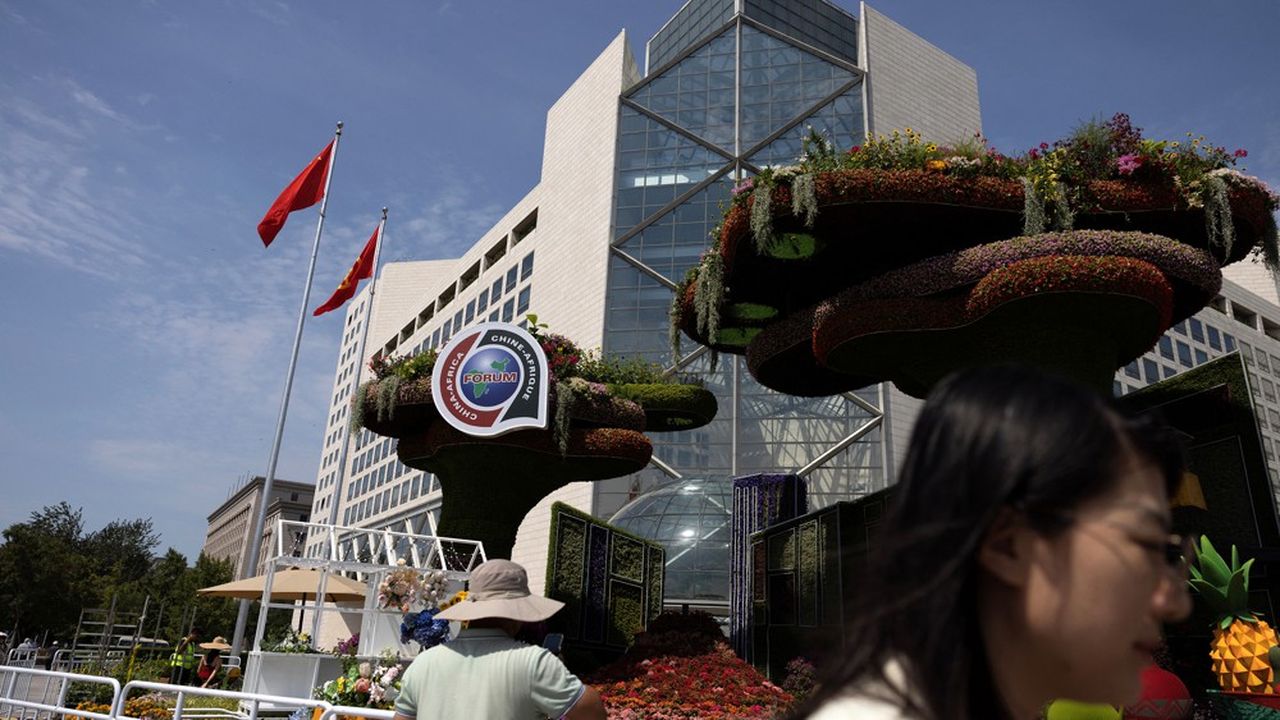
In Beijing, the coming and going of “hongqi”, the official Chinese sedans with tinted windows, has already started. The heads of state of more than 50 African countries landed in the Chinese capital for the 9e Forum on China-Africa Cooperation (FOCAC) which starts Wednesday for three days. All of Africa has made the trip, except Eswatini, a small state of 1.2 million inhabitants which maintains diplomatic relations with Taiwan and therefore does not recognize the People’s Republic of China.
Enough to give back to this Forum, created in 2000 by China to structure its relations with the continent and promote the “Chinese model” of development, its airs of a grand mass of Sino-African relations (282 billion dollars of trade in 2023). But the Forum serves all Chinese diplomacy since it is one of the bodies through which Beijing hopes to take the leadership of the “Global South”, according to the consecrated formula.
In a sign of its importance, President Xi Jinping himself will open the forum on Thursday with a highly anticipated speech. This is the largest diplomatic summit China has hosted since Covid. Politically, China has a rare window of opportunity, as the presidential campaign is in full swing in the United States and Europe continues to focus on Ukraine and the conflict in the Middle East.
Redefining the relationship
From an economic point of view, too, the stakes are crucial for Beijing. China wants to take advantage of the event, which only takes place once every three years, to relaunch its relations with Africa, while the country has lived in isolation for three years due to the strict “zero Covid” policy. In 2021, during the last Focac held in Dakar, Xi Jinping spoke by videoconference. China was represented by its Minister of Foreign Affairs, Wang Yi.
Above all, China had been less forthcoming than in the past, promising “only” $40 billion in financial aid, compared to $60 billion in 2018. The amount that will be set this week for the next three years will therefore be particularly scrutinized. “Covid has marked a halt in the Sino-African relationship,” recalls Sun Yun, associate researcher at the Stimson Center in Washington. In this context, Focac 2024 must redefine the relationship and open a new chapter.”
As in 2021, China will consider financing new infrastructure projects (highways, high-speed rail, airports, etc.) sparingly. In the past, some of these turnkey projects financed by China have put several African states on the brink of the abyss, unable to repay their Chinese creditors. As a result, in 2023, the country granted $4.6 billion in new loans to Africa, an amount up for the first time since 2016, but still below historical peaks (nearly $20 billion in 2013 and almost $30 billion in 2016), according to Boston University.
“Any lender wants a return on investment. China has learned its lesson. Since Covid, it has approached these infrastructure projects with more caution and is financing them more through multilateral financing,” recalls Jodie Sun, a historian specializing in Africa at Fudan University in Shanghai.
Electric vehicles
At a time when its internal growth is weakening, China’s priority is now to export its technologies to Africa: electric vehicles, solar panels, batteries, etc. A crucial issue for Beijing, which is gradually seeing developed markets (Europe, United States) close in a context of trade war.
“China has been expanding its markets in Africa. Previously, the continent used second-hand cars, especially Japanese Toyotas, which consumed more fuel and polluted the environment. Now, Chinese electric cars are enjoying good growth in Africa,” said Wang Yiwei, director of the Institute of International Affairs at Renmin University in Beijing. In fact, China’s exports of electric vehicles to Africa increased by 291% in 2023, according to Chinese customs. Sales of lithium batteries doubled, while exports of solar panels increased by 57%.
On the other hand, many African countries are seeking to reduce their trade deficit with China. In 2023, China imported $107 billion worth of African products (-1.3% in one year), while its exports to the continent reached $170 billion (+13.2%), according to customs. In recent days, many African heads of state have taken advantage of the Forum to meet Xi Jinping bilaterally and called for a rebalancing of trade.
“Covid has created enormous pressure on African countries regarding their growth and debt sustainability,” recalls Sun Yun. “Africa will therefore also look to China for growth opportunities.” In addition to exports, African countries are counting on the establishment of new Chinese factories, with local jobs as a result.




